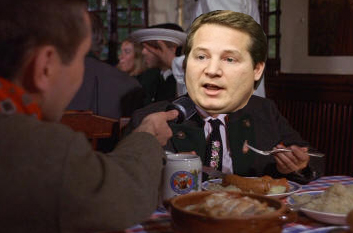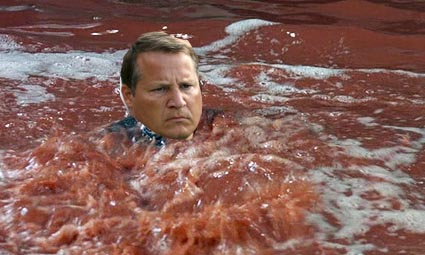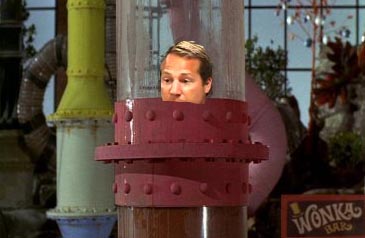
*Subtitle: Down the Brown River: Gluttony, Hubris, Self Control and Adolescent Urges in Augustus Gloop and Eric Mangini
* Stick around til the end for the "Mangini is really just a momma's boy" discussion.
By now it's probably old news to you that a piece appeared in Rolling Stone blasting Eric Mangini and the Cleveland Browns. While that story serves merely as an introduction to what will follow below, the facts bear repeating, at least in quick order.
The mere existence of Matt Taibbi's scathing take on Mangini made the blog and Twitter rounds today, assisted in no small part from the AP summarizing and writing about it. I'm assuming the newsworthiness of this item had more to do with the fact Rolling Stone piled on our sorry franchise than the metaphors used within the piece, but regardless, everyone latched on to the fact that Taibbi compared the Browns coach to Augustus Gloop, the tubby character from Charlie and the Chocolate Factory. I doubt it would have got this much attention if he compared Mangini to Farley Drexel, nor would it have made as much sense, so kudos to him for going with Augustus Gloop. The AP approves.
Unfortunately the story has yet to appear on Rolling Stone's site, and I haven't had a chance to pick up the latest issue, so I don't know the full context of everything that was written; but we do have some quotes taken from the mag thanks to Cleveland Sports Torture.
"I always wondered what happened to Augustus Gloop, the fat little boy in Charlie and the Chocolate Factory...a boy with fat bulging from every fold, with two greedy eyes peering out of his doughball of a head—(but he) somehow ended up as head coach of the Cleveland Browns, perhaps the most fucked franchise in all of sports right now."

Which got me thinking. Eric Mangini and Gloop do share a certain generic doughy quality, and I can certainly appreciate the visual similarities, but there's much more to this story. All the deeper issues concerning both the coach and the character are ripe for analysis. There's gluttony, sin, behavior, consequences, actions, golden tickets, redemption, manipulation, impermanent situations, and payoffs that are not guaranteed simply with the allowance of an opportunity to gain them. Introducing a fictional character into the discussion of Eric Mangini and digging deeper into that character through fictional and literary criticism could go a long way towards helping us better understand the man, getting closer to the truth through excavation even though one might assume reality would be obfuscated by introducing make-believe into the equation. No, we're talking about Willy Wonka here. And football, which is like the furthest thing away from real life normal people can get. Plus, did I mention Willy Wonka solves all.
The simplest and most obvious place to begin is with the personality characteristics the two share. Augustus Gloop is the visual definition of gluttony — he eats while on-screen in the original movie more than Brad Pitt does in Ocean's Eleven. Presented with the Golden Ticket and a tour of Wonka's factory Gloop is unable to control himself, lunging into the chocolate river despite being told not to.
Eric Mangini's power machinations in Cleveland, and New York, are well-known. From the petty fines, the water bottle incidents, getting rid of talented difference makers whose personalities didn't mesh with his, to essentially running the organization, stuffing in-name-only GM George Kokinis in a conference room somewhere, and filling up the roster with "his guys," nevermind whether they can actually play our not — he's rubbed enough players the wrong way and often enough that he has built an inescapable reputation.
If in New York Mangini was allowed five meals a day, he's allowed a veritable 24-hour buffet in Cleveland. His desire for complete and utter control has been unfettered in Berea. Eric Mangini has found his chocolate river and he can't stop himself. He wants what he wants, when he wants it, how he wants it, and there's no one there to stop him.
In Why We Watch: The Attractions of Violent Entertainment, in an essay entitled "Violent Delights in Children's Literature," Maria Tatar writes about Roald Dahl's treatment of the behaviors of Augustus Gloop and the other bad children:
While it may be appealing to witness the torments of Augustus Gloop, who has been described as "enormously fat" with "great flabby folds of fat" bulging out from his body and a face like a "monstrous ball of dough," it is unclear that Dahl's story is any less disciplinary in its ultimate intent than many earlier cautionary tales. After all, unruly children, like the greedy Augustus Gloop, the spoiled Veruca Salt, the gum-chewing Violet Beauregarde, and the compulsive television watcher Mike Teavee, all receive their deserved punishments in the end, while the saintly Charlie Bucket gets the ultimate reward of owning a candy factory. Like Locke, who focused on correcting bad habits so that the child would ultimately internalize adult behavioral codes and no longer require supervision, Dahl seems intent on changing habits that are repulsive to the adult.
We can only hope that Mangini gets his just punishment in the end and that the end is soon, but with Randy Lerner at the helm of this "fucked franchise," it's hard to know when that's going to come, especially since Randy Lerner is Mrs. Gloop.

Yes, Mrs. Gloop. Her character is the one that allows Augustus to do whatever he wants. Dahl's book is as much an indictment on the parents as it is of the children. By that I mean I think he meant to say that every mother and father alike should buy their kids gold-plated everything, but I'm not sure. Anyway, she encourages Augustus to eat, defends him from everyone that looks at him strangely as he shovels a five-course meal into his mouth, and dotes on him as if he were the perfect human specimen.
When Randy Lerner learned that Mangini was fired from the Jets, he almost immediately had his mind made up that he was going to hire him. Hell, he supposedly walked out of his press conference with reporters to start making the phone calls as soon as someone informed him that Mangini was available. He's at fault for singling out Mangini and allowing him to direct Kokinis into the GM position. He's shoveling the mashed potatoes and gravy into Eric Mangini's mouth and telling him he's as skinny and beautiful as Megan Fox. She allowed the process to continue to the point of no recourse other than watching her son get sucked up a big chocolate-filled tube.
Which brings us to Carolyn Daniel and what she wrote in Voracious Children: Who Eats Whom in Children's Literature:
"Mr. Wonka tells Augustus that he "must come away. You are dirtying my chocolate!" and both his parents remonstrate with him. Emphasis is placed upon the child as source of the contamination. He is all body and no mind; his body's appetite overwhelms him. In psychoanalytic terms, it could be argued that Augustus has failed to properly separate from his mother, signified by his insatiable and transgressive desire for food. He is stuck in the oral phase; the phase of maternal influence. Food is the wrong object for his desire; he ought to have turned to the father/phallus in order to achieve proper masculine subjectivity. Augustus is connoted as monstrous and denied agency by his inappropriately directed and excessive desire."
Come on. You knew it was all going to end up there.
Now, if you want to go strictly on the basis that Eric Mangini bears more than a passing resemblance to Augustus Gloop, then another quote from Carolyn Daniel will suffice as an ending: "... suggests that Augustus's doughy face evokes notions of precultural primitivism and irrational mindlessness."
And, finally, yes, in this scenario Josh McDaniels is clearly Charlie Bucket.
Note 1: It is unbelievably hard to find decent pictures of Augustus Gloop from the original Willy Wonka movie, and I refuse to use anything from the Johnny Depp abomination. I prefer to not even acknowledge that movie exists at all. Long live Gene Wilder.
Note 2: Yes, it hasn't escaped my attention that the river is brown, both meaningful for our team and the team's current condition, which is furthered by the whole toilet-like suction thing going on with Augustus.

